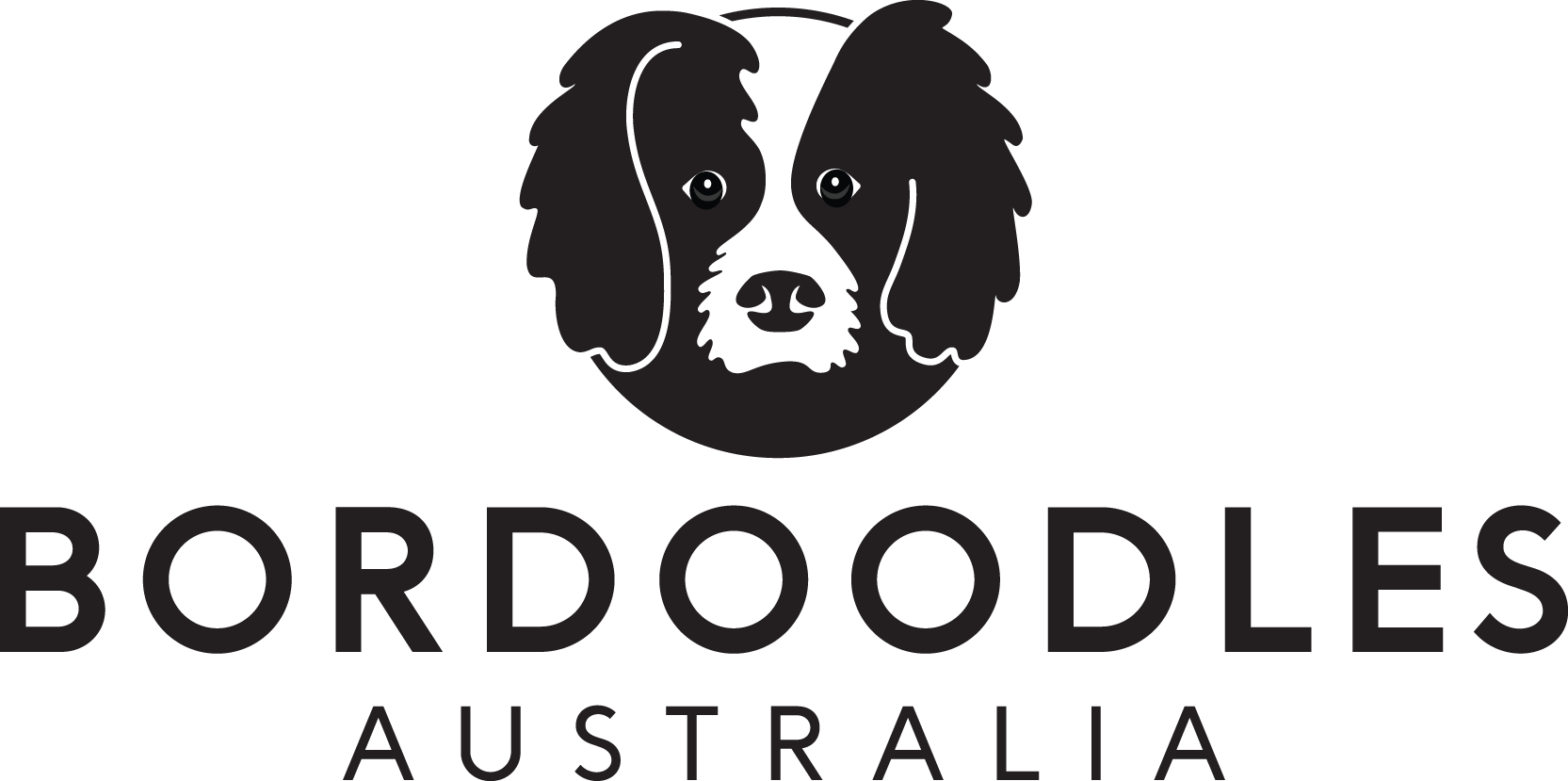– Purchasing –

Pricing
Please enquire within for prices.
We are available for you to collect your puppy any time during the week by appointment.
Unfortunately, we are not available for pickups on Saturday or Sunday, due to family and work commitments.
Important Information
Waiting List / Deposits / Puppy Allocation Process
Our puppies are very popular and we have a high enquiry rate. We keep a waitlist for each upcoming litter. We very seldom have puppies to offer people that are not placed on a waitlist.
To be placed on a waitlist we require a deposit of $500 which we request by bank transfer. Once you place a deposit, it is available for you to use on any puppy over a 12-month period. Deposits are not refundable. We try to match people with their colour and gender preference as quickly as possible but of course cannot guarantee puppy appearances/sexes before birth, we can only provide an educated guess.
Once puppies are born we notify people on our waitlist with what we have available within 2-3 days of the birth. As a general rule you will be offered a choice between 2-3 puppies depending on your preference. We will send you photos of each available puppy showing markings and appearance. You will be required to pick your puppy off the photos. Once you indicate which puppy you would like, your deposit then secures that puppy. We will then send you updated progress photos of your puppy every two weeks.
If you don’t want any of the puppies offered to you in the first instance or the timing doesn’t suit you, you will then be put on the waitlist for the next litter.
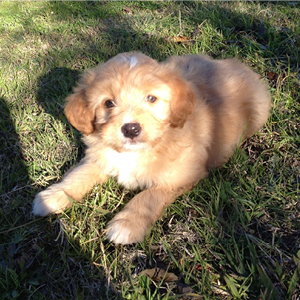
Visitation
We allow people the opportunity to come and meet their puppy between 6-7 weeks of age. This means that puppies are up and walking and old enough to socialise. They will have also had their first vaccination which is an important step in protecting their health. You can arrange a mutually convenient time to meet your puppy once you have placed the security deposit.
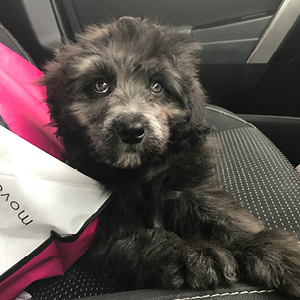
Transport
We can organise puppy transport for our interstate buyers. We use Qantas Freight who are fantastic with scheduling and take great care of our puppies. They also offer very competitive prices. Our puppies are flown from Canberra Airport. The cost of the flight is the responsibility of the purchaser. We organise and book all flights for our customers, all you will need to do is collect your puppy from the receiving end. For NSW buyers, we may also be able to assist with delivery by using Goulburn as a delivery point.
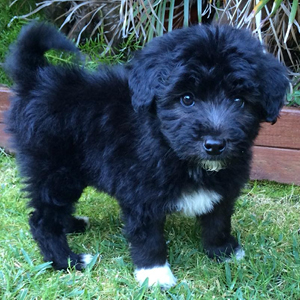
Final payment
Once the deposit is received we do not require final payment until pickup. In instances where puppies require shipping, we require final payment for puppy plus the transport the week of delivery. Once flights are booked (usually 5 workings days before the date of the flight) we will forward you the booking confirmation and request for final payment. The funds will need to be cleared into our account before we will ship the puppy.
We understand people are sensitive around payments to an unknown source given there are many internet scams circulating in today’s world. We welcome all questions and can be contacted by phone to ease any concerns you may have.
Comparing our Bordoodles
Breed Stabilisation
Over the last 15 years we have strived to produce a uniform breed that can be easily recognised as a Bordoodle.
Initially we crossed the Border Collie to the Miniature Poodle. The results were that there were many variations in size and temperament. To eliminate some of these undesirable traits of the first cross we infused the Cavalier King Charles into our Miniature Poodles. We have also discovered the beautiful natures, coat, types of face shape of the Old English Sheepdog. We believe the infusion of these breeds into our Poodle lines stabilises the breed by producing consistency in the progeny and also results in a more desirable coat and a well-rounded face that is only known in our puppies, and not the long Poodle snout found in others.
Bordoodles Australia reserves the right to modify the stabilisation process or our genetic lines at our discretion.

Other Bordoodles
We have had reports (with proof) that other breeders are using our pictures of our puppies/fully grown Bordoodles as their own dogs and puppies. Please be mindful of this because if you’re purchasing a Bordoodle from an inexperienced breeder you have no idea what they will mature into. All images on this website are Bordoodle Australia’s puppies/dogs over the last 15 years and unauthorised use of them is illegal.

Puppy Farming
Bordoodles Australia strictly does not support puppy farming, and we have recently had reports that puppy farmers are starting to incorporate this breed into their operations. If we cannot provide you with a puppy, we will try and put you in contact with another breeder whom we know and trust.

Commitment of Owning a Dog
You shouldn’t take the responsibility of adopting one of our dogs lightly as they will be in your life for the next 12 to 15 years. We only want our puppies to go to the best of homes and will try our hardest to help you determine whether they would be the right dog for you and your family.
If you choose to adopt one of our puppies we hope to have a close relationship with you over the coming years. We love progress reports and being updated with photos as they grow. We welcome any questions and are always available to give you advice. If for any reason you need to rehome your dog please contact us and we will be able to assist you in finding an appropriate home.
Your Puppy
When it is time to take home your puppy, they will be 8 weeks of age and will come:
Vaccinated
Your puppy will receive its first C3 vaccination at 6-7 weeks of age. The next C5 vaccination is required at 12 weeks of age. It is very important that you do not take your puppy into public places until the 12 week shot has been administered. Your puppy is at risk of deadly diseases and not fully covered until the booster shot is administered. It is under strict advice that during this period, you keep your puppy in your backyard and away from other dogs whose vaccination history you don’t know.
Vaccinated
Your puppy will receive its first C3 vaccination at 6-7 weeks of age. The next C5 vaccination is required at 12 weeks of age. It is very important that you do not take your puppy into public places until the 12 week shot has been administered. Your puppy is at risk of deadly diseases and not fully covered until the booster shot is administered. It is under strict advice that during this period, you keep your puppy in your backyard and away from other dogs whose vaccination history you don’t know.
Microchipped
We register your puppy’s microchip into the NSW Pet Registry database which then identifies your puppy on the national microchip database. You will then be required to complete the transfer of the microchip online.
Microchipped
We register your puppy’s microchip into the NSW Pet Registry database which then identifies your puppy on the national microchip database. You will then be required to complete the transfer of the microchip online.
Wormed
Your puppy will come wormed with Drontal at 2, 4, 6, and 8 weeks of age. Worming your puppy is essential to the wellbeing of your dog and can result in a longer life expectancy. A continued worming regime with Drontal once every two weeks until 3 months of age is recommended, and then once every month until 12 months of age. When your dog is 12 months of age worming is required once every three months.
Wormed
Your puppy will come wormed with Drontal at 2, 4, 6, and 8 weeks of age. Worming your puppy is essential to the wellbeing of your dog and can result in a longer life expectancy. A continued worming regime with Drontal once every two weeks until 3 months of age is recommended, and then once every month until 12 months of age. When your dog is 12 months of age worming is required once every three months.
Vet Checked
Your puppy comes fully vet checked. Our wonderful and very experienced vet examines your puppy’s structure, bones, eyes, heart, teeth, ears, and skin. We do not allow puppies that are not 100% healthy to leave us.
Vet Checked
Your puppy comes fully vet checked. Our wonderful and very experienced vet examines your puppy’s structure, bones, eyes, heart, teeth, ears, and skin. We do not allow puppies that are not 100% healthy to leave us.
Desexed
All our puppies leave us desexed. This is compulsory. We do this to promote responsible breeding. The procedure is done between 6-7 weeks and is minimally invasive for the puppy. The stitches are internal and will dissolve on their own. The incision area will need to be kept clean until it heals.
Desexed
All our puppies leave us desexed. This is compulsory. We do this to promote responsible breeding. The procedure is done between 6-7 weeks and is minimally invasive for the puppy. The stitches are internal and will dissolve on their own. The incision area will need to be kept clean until it heals.
Preparing for Your New Puppy
To help you prepare for your new puppy the following advice may be useful:
Preparing for Your New Puppy
To help you prepare for your new puppy the following advice may be useful:
Bedding/Litter Separation Anxiety
Your puppy should have a small enclosed area where he/she can sleep. He is likely to be a little upset over the first few nights and will possibly cry throughout the night. To try and settle your puppy put a blanket, small soft toys his size and a hot water bottle in the enclousre over night. This will simulate his litter mates. If you have another dog, try sleeping your puppy with him/her as this will help the separation anxiety.
Your puppy is used to sleeping outside, so it won’t be issue if you continue to sleep outside. If you choose to sleep your puppy inside, crate training is a good option.

Food
Puppies are fed a premium diet consisting of beef pet mince and Ivory Coat Puppy kibble (chicken flavour). The mince is fed raw. When you bring your puppy home it is advised to continue this diet for the first 6 -8 weeks. You are then welcome to change to a diet that suits your preference, however we do recommend not to feed high end kibble products due to the additives and hormones used.
Puppies are currently being fed one cup of each kibble and mince (well combined) morning and night. Adjust as necessary.
Please be aware that a change of environment can lead to stress and an upset tummy for a new puppy. If this occurs feed your puppy cooked rice and shredded chicken (no mince) until stomach/bowel movements are back to normal.

Puppy Proofing
You will need to make sure your yard and house are puppy proof. Your yard will need to be fully fenced with no areas that present a possible escape option. Swimming pools are a serious hazard and pool fences will need to be improved if a puppy can squeeze through it. It’s also a good idea to keep your puppy from general view of the passing public to prevent people from stealing your dog.
Your house will also need to be prepared. Section off any areas that you don’t want your puppy to be, remove items that you don’t want your puppy to chew and remove any potential hazards to your puppy, such as electrical cords.

Puppy School
Please think about enrolling your puppy in Puppy Preschool. They have excellent classes which provide you with lessons on basic training, advice on all aspects of pet care, discussion of common problems and they allow puppy socialisation in a safe environment.
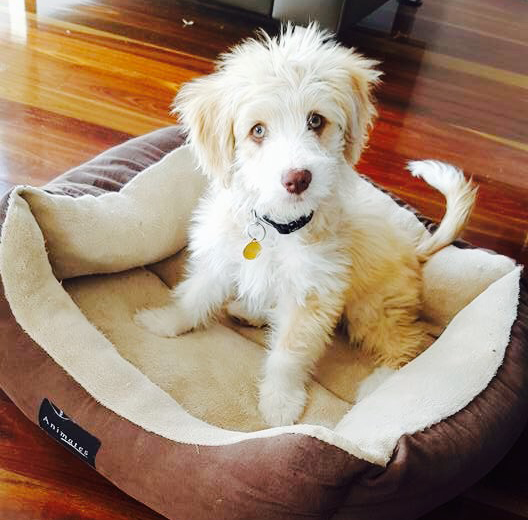
Essential Items for Your Puppy
- A warm bed/crate/kennel which is placed where your puppy is going to feel safe and secure to sleep.
- Food dishes, one for water and one for food. Stainless steel is better as it cannot be chewed up.
- You will need to purchase some advocate for puppy’s/small dogs. This will need to be put on your puppy as soon as you get him/her home. Adovocate is a very good product and it will protect your puppy from heartworm, fleas, lice, gastrointestinal worm, lungworms, ear mites, sarcoptic mange and Demodex mites.
- A leash, collar and an ID tag. The ID tag should have your phone number on it and be placed on your puppy’s collar.
- You will need some toys to play with your puppy with as well as to keep him occupied whilst you are not there. Chew toys, soft toys and puzzle toys such as the Kong range are all good selections.
- Paper towel or puppy training pads! Your puppy is going to have accidents during the toilet training phase.
- Other things that can be handy to have are healthy treats to use for training, a book on how to raise your puppy and positive training techniques (this is particularly useful for people who have not had a puppy before).
Helpful Shopping List for Your New Puppy

Helpful Shopping List for Your New Puppy

- Fresh Chicken mince can be purchased from your local butcher, supermarket or pet food store. I freeze appropriate size portions in the freezer.
- You will need to purchase Advocate for dogs 4-10kg. This will need to applied when you take your puppy home. Advocate can be purchased from your local pet store.
- You will need 2 x stainless steel dishes, one for water and one for food. These can be purchased from your local pet store.
- You will need a dog collar, leash and ID tag. These can be purchased from your local pet store.
- You will need a warm bed for your puppy to sleep in. Remember that your puppy will grow up so buy something that he/she will fit in as an adult. These can be purchased from your local pet supply store.
- You will need some paper towel if you plan on having your puppy inside.
- Dog training treats can be used to help you train your new puppy. Training treats are available from Supermarkets and your local pet store.
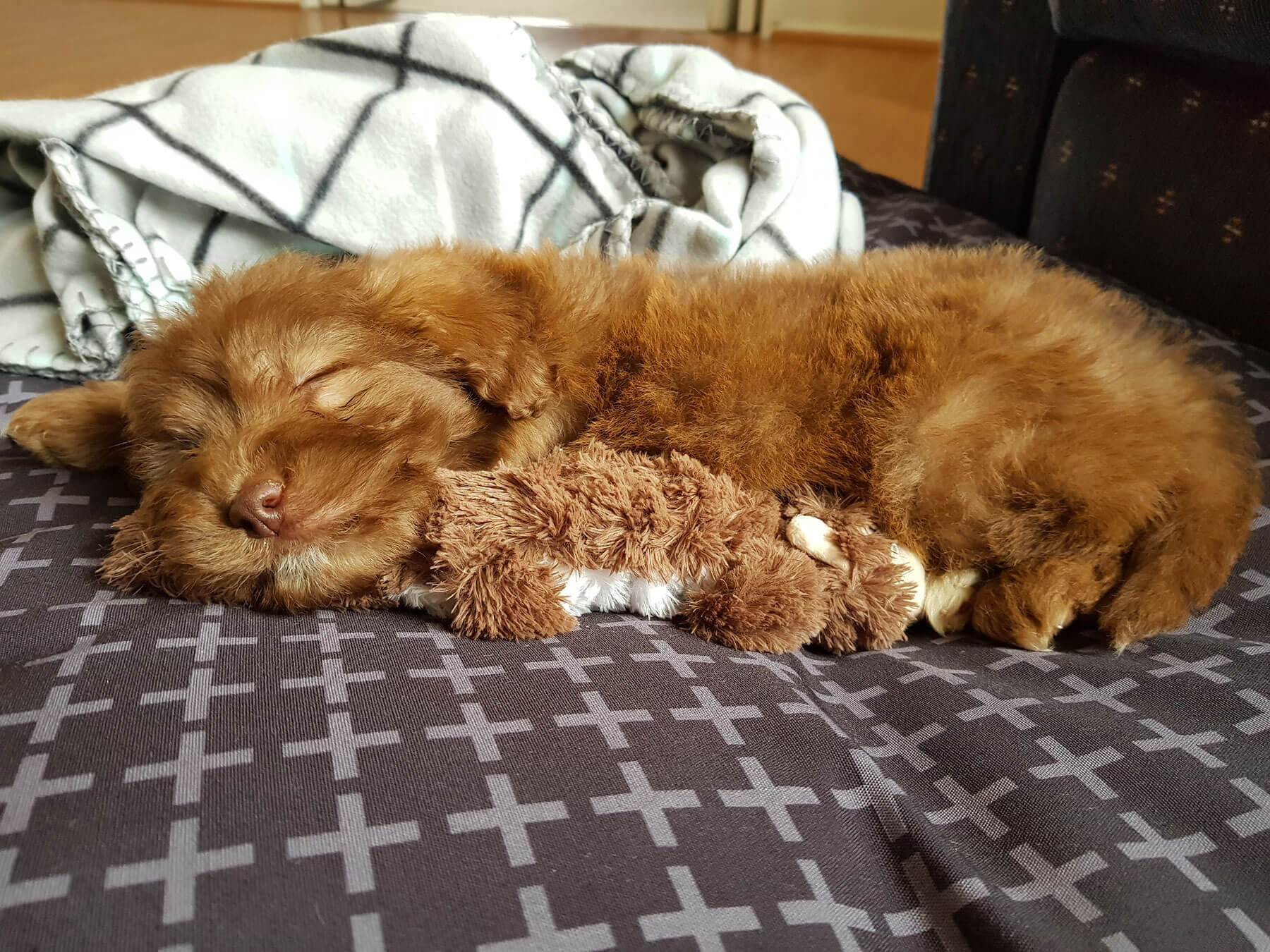
Important information for bringing home your new puppy
Transitioning to a new environment can be quite stressful for a puppy. It is important to reduce stress. There a few things you can do to help with this:
- Avoid major dietary changes
- Don’t overtire the puppy
- Let the puppy have undisturbed sleeping and rest periods
- Confine your puppy when it is by itself so it doesn’t get lost or into trouble
- Let your puppy have the company of people as much as possible
- Let your puppy explore your home
- Let your puppy get used to its family before introducing it to new people
- Provide your puppy with fresh water at all times
- Stick to the recommended puppy diet guide
- Put your puppy somewhere quiet so it can eat without distractions.
